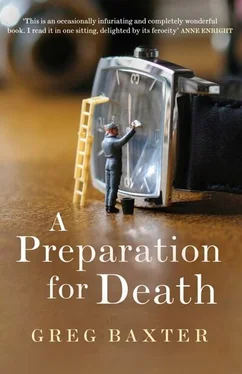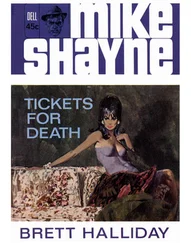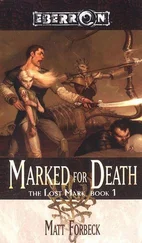I begged to know whether or not he liked my writing. He refused to answer: to him the question of liking something was the stuff of an irrational mind. An essay was sound or unsound: it had no other value. He could perform an exegesis, but not a review. I was emotionally battered then, and I nearly wept: I felt sick for caring — my whole premise was that I was past caring. I told him I would quit; I would kill myself. He seemed bored and annoyed by my emotion, and gracefully said he had only wanted a debate, but I was not up for one. We changed the subject, drank the wine and went home. When we got there, Elísabet was finishing her novel on my computer in the dining room. Nothing stopped that woman from creation — she was like some mythic mother figure, birthing new ideas and creatures at the speed of light. I drank some vodka and Fielding had a glass of water, and we all talked for an hour. I felt I might die from frustration.
Fielding’s parents always hope I might provide him with some direction when we are together, and as much as he’d been sent to see that I was all right, I also knew his father wanted me to knock some sense into him. The truth is that I felt nothing for his life, and his assuredness, but envy, and I had nothing but admiration for his commitment. He wants nothing in life but to be given space to think, and record his thoughts, and edit them. He is given a small monthly allowance by his father and rents out rooms in a house his father bought for him. He demands absolute silence from his housemates. They are not allowed to play music, and there is no television. He has gone through many phases: athlete, hunter, fiction writer, monk, high-dollar rug salesman. But his most recent incarnation — philosopher — seems to suit him. I studied philosophy as an undergraduate and graduate student — at the University of Texas and the University of Sussex. I also aped as a philosopher. If I read Hegel, I believed and wrote like Hegel. It was the same with Kant, Nietzsche, Spinoza, Schopenhauer, Plato, Wittgenstein, Heidegger, Adorno, Benjamin. In philosophy, I was always a reactionary: at Texas, surrounded by conservative students, I became a Marxist and kept a copy of the Communist Manifesto (in German) in my back pocket. When I got to Sussex, everyone was a radical, so I threw myself into American pragmatism and told people I was a libertarian and capitalist.
Since I am not who I am, I must embrace the form that suits me best. Fielding’s seven-page essay took him twelve months to write. He was tackling an unimaginably large problem with unimaginable concision. I was finishing my essays as fast as I could type them. He spent a year making sure there was nothing dispensable in his writing, and that nothing was repeated. I repeat myself with recklessness, and since I am the subject, and I am dispensable, there is nothing I say that is essential. He is precise; I am erratic. He refines; I pollute.
I went to the West for a few days after my thirty-fourth birthday. It was the first week of September, and a slow fortnight of teaching before the heavy load of autumn began. I had just learned I was going to be a father — Clare was almost two months pregnant — and there was, and still is (it is October now), a dust cloud in my head from the explosion of that discovery. I have no thoughts that feel right, or if they do, minutes later I’m ashamed of them. I decided I would like to buy a large German sedan, for instance, with an excellent crash rating and leather seats. I decided I would like to live in the country. I decided I wanted another child, maybe another two, with Clare, as soon as possible. She let me discuss these things out loud with myself. And she did not seem too disappointed when I reversed them, only amused. At that time all she could do was sleep and rub her belly: she was starting to put on weight from eating the whole time, but it was good weight and she looked beautiful. Her breasts were large and robust. I groped and sucked them relentlessly.
We stayed just outside Letterfrack, in a white cottage with a red door and skylights in the roof. When we arrived, Clare immediately rearranged the furniture so that the couch was in front of the fire, and fell asleep with a plate of bread in her lap. I felt that I had some job to do, some responsibility. I made sure the fire would blaze. I unpacked the groceries. Nothing else needed to be done. I read from a few of the books I’d brought with me, but I was not in the mood to sit still. I walked outside to take pictures of the landscape with my phone — the inlet, the little road, and Bengooria, the small mountain that stood over us to the east.
The first two days were warm and sunny. This slightly disappointed me: I had hoped for something grey and violent, so that the windows would rattle, and the front door would creak on its hinges, and threaten to blow open — the kind of elements that make you feel that civilization is impossible to reach. Instead I could perch on the fence post outside with a coffee, aim my face into the sun, and watch the traffic go by.
Bengooria is not terrifically imposing — one is never really in its shadow — but it is unique among hills in the vicinity. The English name, Diamond Hill, is fitting: the ground rises up around it, green, tan, rolling, until it shoots up in dramatic grey rock. And when the sun hits it, parts of it go white, so that it could, if you were trying to come up with a name, resemble a dirty crystal. I have a tendency to accept new sights — especially the sublime — as new mythologies in me. The feeling is not exactly articulable; sometimes you feel a thousand years old, sometimes you feel that you are home in an unfamiliar place: it is like remembering, but there is nothing to remember. Sometimes you sense that the earth could tell you stories, that a stone might suddenly shout, You’re standing on top of me! or that if you waved a magic wand, all the mountains and trees would reveal themselves as ancient gods and kings and begin to wage war with each other. I did not know what I thought of Bengooria, but it was alone, rather pretty, and exposed, and seemed to draw fascination out of me.
In the stack of books I brought with me, the one I most looked forward to reading was a collection of essays by Tim Robinson, who has spent the past twenty years writing about, and mapping, Connemara. I am tempted, always, to make much of landscape, and to go on about it as though I invented it. But to be here, and considering landscapes, is to be doubly on Robinson’s turf. Over the first twenty-four hours, I studied the sight of Bengooria so that I might come up with a word for it, one bright shining word, small but hard as a stone [Goyen]. It was on the second day, Thursday, that, reading Robinson, I came across his attempts to name a sight, from the topmost peak of Errisbeg, where Roundstone Bog becomes visible as a whole for the first time, stretching away to its indeterminate limits, which are often blurred with haze …
I have tried several times to describe this landscape. Not long ago I went up to look at it again from the top of Errisbeg, trying to find an adjective for it, and the one that came spontaneously to mind was ‘frightened’. For a moment I felt I had identified the force that drives the expansion, the self-scattering, of the universe: fear. The outline of each lake bristles with projections, every one of which is itself spiny; they stab at one another blindly. There is a fractal torment energizing the scene, which is even more marked in aerial photographs, in which the lakes seem to fly apart like shrapnel. Of course all this is purely subjective and projective: I was the only frightened element of the situation.
I quote this at length not only because I want to compare his predicament with my own, but because I like it so much. That is all that matters now; I am compelled to write it down again, here and in my thoughts, so that I can appreciate what it might have felt like to write. There was a time in my life when I would not have done so, because I would’ve been too ashamed not to have done my little mountain more justice than his bog. I might simply have reprocessed the scene and called it my own, or called it inadequate because I was jealous.
Читать дальше












